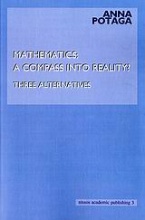Mathematics: A Compass into Reality?
Three Alternatives
Since remote antiquity the marvel of the applicability of mathematics has beset humans, who have since tried to rationalize it in various ways. The Pythagoreans took number to be the essence of the universe, Plato achieved rationalization by activating his Ideas mathematically, and Cusa, in the New Era, considered the Monad, the principle of numbers, to be the principle of life and of cosmic order and as the means of 'mental measurement', the comparison of the human intellect with its knowable object, similar to Aristotelian assimilation; all of them, and also many other philosophers, tried to answer the question, each according to his own philosophy. These approaches, although outlined very roughly, manifest the metaphysical character, which mathematics has borne from antiquity and partly continues to bear even today. The passage of time, however, and the gradual emancipation of the human intellect from all kinds of bondage brought about new aspects of the problem. The concern of philosophers and mathematicians gradually diverted from the examination of mathematical entities as such, and of their relation to the human intellect, towards the contribution mathematics makes to the elucidation of natural laws. [...] (από την εισαγωγή του βιβλίου)
- ISBN978-960-8392-37-3
- Ημ/νια Έκδοσης2007
- Σελίδες129
- ΔέσιμοΜαλακό εξώφυλλο
- Διαθέσιμες Γλώσσες
- Κατηγορίες Βιβλίου
- Θεματολογίες Βιβλίου
- Συγγραφέας
- Εκδότης




